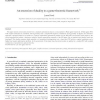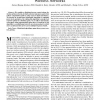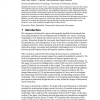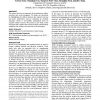1167 search results - page 127 / 234 » Relational Markov Games |
AUTOMATICA
2007
13 years 10 months ago
2007
This paper extends some duality results from a standard optimization setup to a noncooperative (Nash) game framework. A Nash game (NG) with coupled constraints is considered. Solv...
JSAC
2006
13 years 10 months ago
2006
We consider a distributed power control scheme for wireless ad hoc networks, in which each user announces a price that reflects compensation paid by other users for their interfere...
PUC
2007
13 years 9 months ago
2007
The results of a study of two computer games, that use human movement as direct input, were analysed using four existing frameworks and approaches, drawn from different disciplines...
CSCW
2012
ACM
12 years 5 months ago
2012
ACM
This paper discusses an approach for transforming solitary exercises into social exergames. We frame our discussion by highlighting the relation between the original exercises and...
ECML
2000
Springer
14 years 2 months ago
2000
Springer
In the present paper we propose a consistent way to integrate syntactical least general generalizations (lgg's) with semantic evaluation of the hypotheses. For this purpose we...




